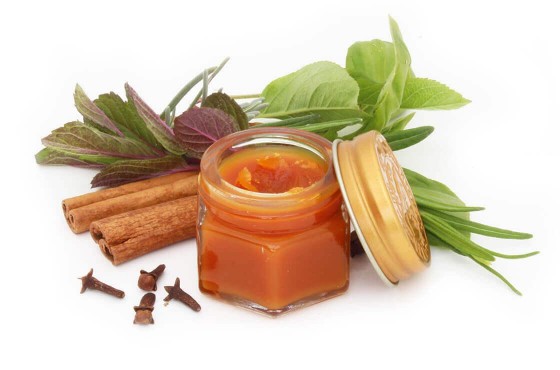Tiger balm:
a chinese remedy with a multitude of benefits
Written by Paul Musset, Doctor in Pharmacy | published on | updated on 21/08/2023

Developed almost 150 years ago by a Chinese herbalist, tiger balm has been part and parcel of traditional Asian medicine for many years. Primarily used to relieve muscular pain, its benefits are now being recognised in other areas of healthcare. What is its secret? Which ailments can it alleviate? How is tiger balm used? Let us explain.
Tiger balm: a soothing cream which hides a multitude of secrets
Background
Tiger balm first emerged at the end of the 19th century. Healers were instructed by the Chinese Emperors to find remedies to alleviate the muscular pain that afflicted them. A Chinese herbalist based in Burma, Aw Chu Kin, began his quest to find an ointment capable of treating a range of aches and pains. He carried out various experiments combining many different essential oils. One of his formulations proved particularly effective and his success spread rapidly throughout the world. Tiger balm was born.
Why “tiger balm”?
Did you know? The ointment was not known as “tiger balm” until after its inventor's death. At that point, his two sons inherited the magic formula. One of them, Aw Boon Haw, whose name means “gentle tiger”, spotted the product's potential and decided to turn it into the familiar brand now known across the world: Tiger Balm.
What is tiger balm's secret?
Camphor is the source of its potent anti-inflammatory effect.
It accounts for 25% of the product’s composition, making it the key ingredient of tiger balm. Camphor is distilled from the Asian camphor tree and is renowned for its many antiseptic and analgesic properties. It is these anti-inflammatory and analgesic properties in particular which alleviate the pain caused by muscular tension.
The freshness of menthol for decongestant action
Menthol makes up 10% of the balm’s composition. Menthol is extracted from peppermint essential oil and has many useful characteristics. Thanks to its anaesthetic action, it provides rapid relief of the itching caused by bites and stings. When coupled with camphor, menthol reveals its decongestant properties, which help to clear the bronchial passages. It is also responsible for the fresh sensation experienced when using tiger balm.
Cloves and their analgesic properties
The clove is a dried flower bud. Thanks to its analgesic properties, clove oil is a popular treatment for alleviating dental pain. It also has invigorating properties, making it an ideal remedy for fatigue. Clove oil is very potent and makes up only a small percentage of tiger balm, accounting for 5% of red balm and 1.5% of white balm.
Other active ingredients
To enhance its potency, the ointment also contains:
- Peppermint oil for its pain-relieving properties;
- Cajeput oil for its decongestant properties;
- Eucalyptus oil for its effective anti-inflammatory action;
- Cinnamon oil for its invigorating benefits.
Did you know?
Besides its positive health benefits, tiger balm has a range of unusual secrets: it is an effective weapon against termites and can also be used as an insect repellent.
The key benefits of the different types of tiger balm
There are two types of tiger balm, red tiger balm and white tiger balm, each of which has its own specific benefits. Which should you choose?
Red tiger balm - the athlete's friend
This is the most popular type and contains:
- Camphor;
- Peppermint oil;
- Menthol;
- Cajeput oil;
- Clove oil.
Its colour comes from the cajeput oil it contains.
Red tiger balm provides effective treatment for muscular inflammation, joint pain such as arthritis and spasms.
How does it work?
Its combined ingredients play an essential role in the circulation of blood and energy around the body. It relaxes the muscles and reduces inflammation in the joints and tendons (including tendinitis, etc.).
White tiger balm - the enemy of colds and headaches
Its formula is based on:
- Camphor;
- Peppermint oil;
- Menthol;
- Eucalyptus oil;
- Clove essence.
The inclusion of eucalyptus makes white tiger balm a powerful weapon for combating winter ailments such as coughs and colds. When combined with menthol, it is a refreshing pain killer which provides ideal relief for headaches when applied topically to the temples or forehead.
Green tiger balm in the fight against cellulite
Less well-known that the other types, green tiger balm’s higher concentration of camphor and menthol gives it considerable appeal. The formula, which also combines green herbs, has a powerful skin detoxifying effect. Moreover, its ability to combat water retention makes it very effective in the fight against orange peel skin and in improving the appearance of cellulite.
How is tiger balm used?
Correct application is the key to its effectiveness
The method of application is crucially important in ensuring tiger balm’s effectiveness. To optimise the benefits, we recommend it is rubbed into the painful area using circular movements until it feels warm. This signals that the product is working. The fresh sensation that follows confirms that the product has been applied correctly. If necessary, the product can be reapplied 2 to 3 times a day.
Precautions
Whether red, white or green, tiger balm is strictly for external use only. It is essential that you wash your hands carefully after use, paying particular attention to ensuring that no ointment remains under the nails. Contact with the mucous membranes may cause burns or irritation.
You should also avoid use on irritated skin. Camphor essential oil makes it unsuitable for pregnant women and children under the age of 7. Prior to each application, please read the precautions stated on the package leaflet to prevent any nasty surprises.
Tiger balm is a natural remedy that can be used to tackle a range of ailments. It is useful for alleviating winter colds and chills, as well as soothing overused muscles and joints.
Tiger balm: three key takeaways:
- Tiger balm is a powerful natural remedy for aches and pains;
- Very little product is needed for effective action;
- Contact with the mucous membranes must be avoided.



















